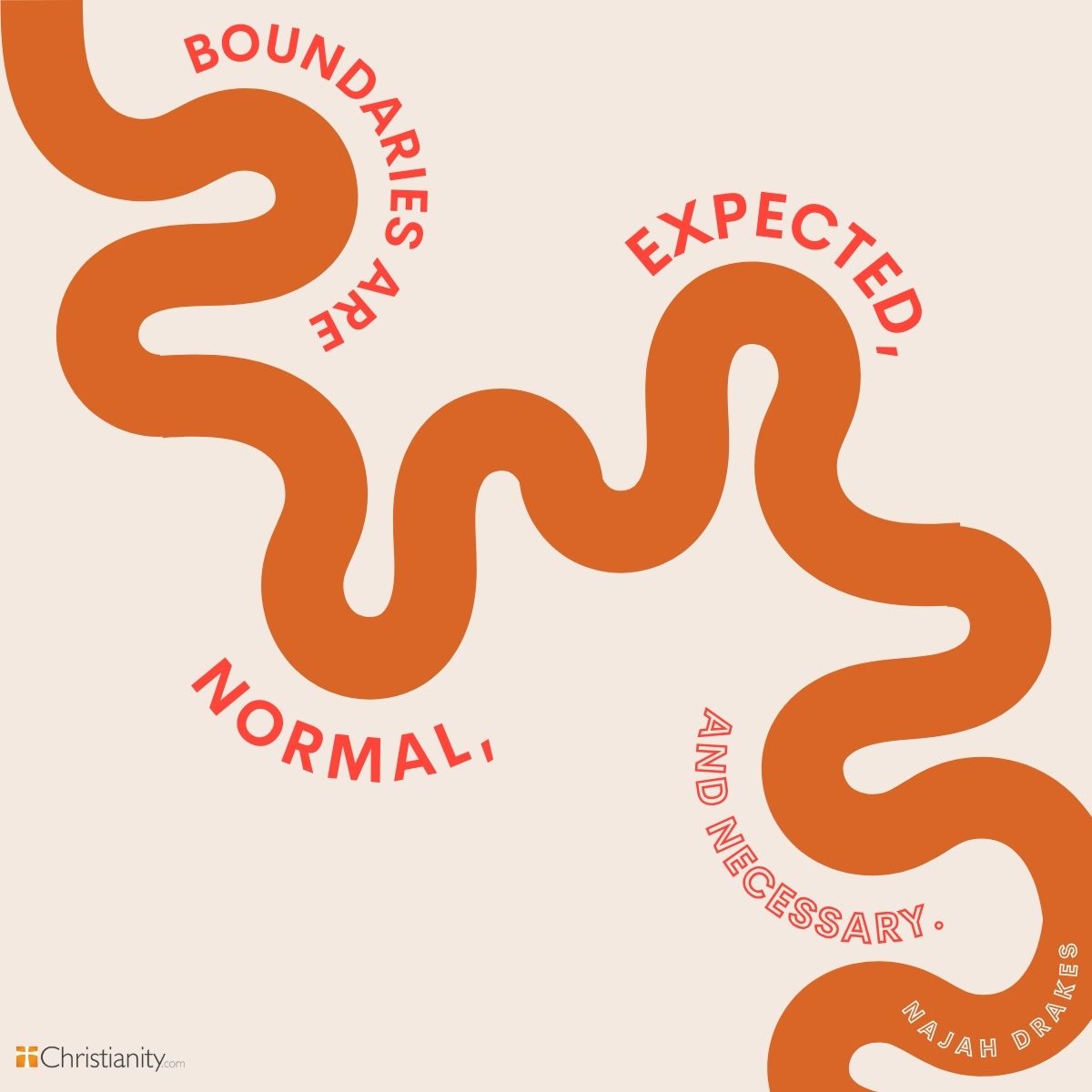Most of us don’t like being advised “No.”
This seemingly innocent two-letter phrase can unleash a tsunami of feelings we might have neatly packed away and labeled with a Sharpie, “off limits.” The truth is we regularly hear greater than is being stated after we discover ourselves on the sending or receiving finish of a “no.” Whereas an individual might merely be setting a boundary, we might hear a problem to our identification and authority, which may really feel scary and probably threatening.
I bear in mind the primary time my cute, little, fat-cheeked, can-do-no-wrong, 1-year-old exercised his human autonomy and advised me, “No!” His favourite phrase rapidly turned my least. It was as if he proudly pinned a golden badge on his chest, signaling to us all there was a brand new sheriff in his toddler city who wielded the ability to set down the regulation. My coronary heart questioned how dare this little rascal, who I labored 47 hours to get right here, inform me what he was unwilling to do. Blindsided by his response, I forgot the essential reality that God hardwired every of us to begin setting boundaries at an early age.
Psychologists contend that between 1 and three years of age, toddlers start asserting their independence. With a baby’s first “no,” dad and mom acquire readability and perception into their little one’s true needs and desires, requiring fewer assumptions. In line with the well-known developmental psychologist Erik Erickson, a father or mother’s response to their toddler’s newfound autonomy is pivotal and might have an effect on their improvement properly into maturity. Vital responses from a caregiver sign to youngsters it’s dangerous to set boundaries, whereas affected person and loving responses talk that setting boundaries is secure and essential.
Should you wrestle with setting boundaries and saying no, you aren’t alone. A latest research decided virtually 60% of Individuals have issue informing others {that a} request, motion, or habits will not be acceptable. This statistic begs the query, if we’re wired by God to set boundaries as youngsters, why are they so laborious to set as adults? A few of our hesitance may be traced again to our previous experiences. When makes an attempt to set boundaries are met with rejection, disappointment, or anger, outdated hurts, and wounds can floor, inflicting us to really feel reluctant to set boundaries sooner or later.
Photograph credit score: ©GettyImages/kupicoo

What Does the Bible Say about Boundaries?
The Bible gives us a masterclass in boundary setting. Genesis depicts a purposeful, intentional God assigning every of his creations distinct boundaries by specifying their roles and obligations on earth. The solar, waters, shores, day and night time got a transparent territory. In truth, God communicated His first “No” in Genesis. After granting Adam and Eve entry to a whole backyard stuffed with timber for pleasure and meals, they had been instructed to respect God’s restrict – the tree of the information of excellent and evil. Once they ignored this line within the sand, they dedicated the world’s first sin, refusing to belief the perfection of God’s parameters. We nonetheless stay with the results of that call at present.

Accepting and strolling within the goodness of boundaries may be laborious. Like Adam and Eve, we’re commonly challenged to speak and stand agency in our convictions. If Eve merely responded “no” to the serpent’s temptation, sin might have by no means entered the world. Settling for a simple “sure” can forfeit the long-term advantages of sustaining sturdy boundaries, leading to penalties that are usually more durable, extra painful, and longer-lasting.
Boundaries talk an ordinary of acceptable behaviors which might be required to stay the purposeful lives God meant for us. Under are seven kinds of boundaries God expects us to set.
Photograph Credit score: Jenny Smith/Unsplash

1. Boundaries on Our Ideas
It’s straightforward to doubt and concern. In difficult conditions, I might be nominated to win the award for creating probably the most outrageous, unlikely “what if” situations in my thoughts. If I’m not cautious, my runaway ideas can lead me into harmful territory. When we don’t proactively handle our ideas, our minds turn out to be prime actual property for discouragement, melancholy, overwhelm, and even anxiousness to arrange residence. Philippians 4:8 instructs us to consider these issues that are true, noble, proper, pure, pretty, admirable, wonderful, and praiseworthy.
“Lastly, brothers, no matter is true, no matter is honorable, no matter is simply, no matter is pure, no matter is gorgeous, no matter is commendable, if there’s any excellence, if there’s something worthy of reward, take into consideration these items.” – Philippians 4:8
In any other case, our hyperactive imaginations may cause our fears to appear extra more likely to occur than they honestly are. God’s Phrase locations our ideas and fears in perspective and reminds us that each final result is topic to the sovereignty of a God who has good plans and hope for us (Jeremiah 29:11). As an alternative of ruminating on the worst, we’re referred to as to solid down unfavorable ideas and renew our minds. In doing so, we keep away from conforming to the behaviors of this world and turn out to be reworked into His picture (2 Corinthians 10:5).
“We destroy arguments and each lofty opinion raised towards the information of God, and take each thought captive to obey Christ.” – 2 Corinthians 10:5
Photograph Credit score: ©Getty Photographs/LaylaBird

2. Boundaries on Our Reactions
We live in a extremely divisive time. Verbal assaults on social media and in actual life are working rampant. As Christians, how ought to we deal with ourselves when assaults land at our entrance door? Jesus was no stranger to insults. On the cross, His identification and factors of view had been challenged and mocked, however He didn’t return lash for lash. As an alternative, He pleaded with the Father on behalf of His crucifiers to forgive their ignorance. Whereas we could also be tempted to hurl again a intelligent keyboard warrior response when insults come our method, God says “no” to fast, hot-tempered reactions. As an alternative, He instructs us to be sluggish to talk, fast to pay attention, and sluggish to anger (James 1:19).
“Know this, my beloved brothers: let each individual be fast to listen to, sluggish to talk, sluggish to anger.” – James 1:19
Photograph Credit score: Sara Kurfess/Unsplash

3. Boundaries on Serving to Others
Jesus didn’t allow His followers. He empowered them. When the lame man in Bethesda complained that nobody would place him within the pool for therapeutic, Jesus prompted him to take actions inside his management. In response, the person stood and walked, albeit at a sluggish tempo, reserving what was past his functionality for Jesus. The person took step one, and Jesus took the following by honoring the person’s request to be healed. Equally, when Jesus encountered the girl on the properly who was residing in sin, He provided her what she couldn’t present for herself. He granted her forgiveness and directed her to repent from a life-style of sin. It’s best after we resist the temptation to intrude within the work God reserves for Himself alone. Whereas one man crops a seed and one other man waters it, solely God could make it develop (1 Corinthians 3:6-9).

“I planted, Apollos watered, however God gave the expansion. So neither he who crops nor he who waters is something, however solely God who provides the expansion. He who crops and he who waters are one, and every will obtain his wages in keeping with his labor. For we’re God’s fellow staff. You’re God’s discipline, God’s constructing.” – 1 Corinthians 3:6-9
Photograph Credit score: Austin Kehmeier/Unsplash

4. Boundaries on Our Time
As a mother of 5, it might typically really feel like I am at all times working out of time, however is that basically true? Regardless of the fixed feeling of racing towards the clock, God allocates a time and season for each exercise beneath the solar. God’s focus will not be pace however completion. He calls us to run and end the race, which He set earlier than us with endurance (Hebrews 12:1). Endurance is reserved for long-distance runs, not short-term sprints. As an alternative of making an attempt to complete sturdy, goal to complete properly. It takes time to develop the traits of a very good and devoted servant. Set up an intentional plan, execute it in decency and order, and align it with the imaginative and prescient, priorities, and goal God planted inside you.
“Due to this fact, since we’re surrounded by so nice a cloud of witnesses, allow us to additionally lay apart each weight, and sin which clings so carefully, and allow us to run with endurance the race that’s set earlier than us.” – Hebrews 12:1
Photograph Credit score: ©iStock/Getty Photographs Plus/fcscafeine

5. Boundaries on Our Priorities
May you think about discovering out a detailed pal died, and your family members blamed you? After the demise of Lazarus, Jesus discovered Himself on this precise place. Mary and Martha had been deeply disillusioned Jesus refused to avoid wasting their brother, his shut pal, from demise. As an alternative of defending himself from their accusations, He double-downed on His project. Lazarus’s sisters prioritized preserving his life, however Jesus’s goal was to resurrect it. There was extra energy within the resurrection than in rescuing Lazarus. If Jesus merely prevented demise, spectators might query whether or not Lazarus survived because of pure luck or the ability of the King. Jesus erased each doubt by prioritizing and glorifying the Father.
Beginning with our most evident and pressing calls for might not correctly elevate an important. To know our priorities, we should search first the dominion of God and permit Him so as to add to and order our things-to-do listing. Like Mary, we’re referred to as to petition God on our knees earlier than we busy ourselves utilizing our fingers and toes.
Photograph Credit score: Bongkarn Thanyakij/Pexels

6. Boundaries with Our Coronary heart and Soul
The center, thoughts, and soul are susceptible entry factors that have to be protected. They comprise our internal being and drive our beliefs, ideas, and actions. Out of our hearts, our mouths and actions communicate (Luke 6:45). Creator Cathy Baker describes the guts as our internal being, the place from which our deepest ideas and needs are birthed. That is why we’re admonished to protect our hearts (Proverbs 4:23). Our objective is to strengthen our internal man, not weaken it. God needs us to restrict participating in actions and with those who threaten the substance of our identification. On the finish of the day, gaining the entire world will not be price dropping our soul (Matthew 16:26).
“For what is going to it revenue a person if he good points the entire world and forfeits his soul? Or what shall a person give in return for his soul?” – Matthew 16:26
Photograph Credit score: ©Getty Photographs/Irina Vodneva

7. Boundaries with Our Bodily Our bodies
Everybody loves a clear home, however protecting a clear home takes laborious work. As a result of our properties typically function a secure haven, we don’t willingly give entry to undesirable or harmful visitors. If invaders try to push previous our entrance door with out an invite, it’s our job to carry our place and guard our beneficial property. Equally, entrants should respect the foundations of our properties. It’s a protected territory. We’re instructed to honor God with our our bodies (1 Corinthians 6:19). Whereas this explicit scripture addresses sexual immorality, I imagine it may be utilized extra broadly. Our our bodies home the spirit of the residing God. Permitting our our bodies to be disrespected or abused doesn’t carry honor to God. It’s our accountability to make sure the temple we stay in stays a clear, wholesome, secure place for the Holy Spirit to dwell. Boundaries are regular, anticipated, and obligatory.

Whereas at first, they might really feel uncomfortable to implement, the extra we observe, the much less wobbly we really feel as we take steps to keep up them. Should you wrestle with boundaries, I pray you could muster up the boldness of a fearless one-year-old, anchor your self in God’s Phrase, and stand agency in your “no” in a world that retains pushing you to say “sure.”
Photograph Credit score: ©iStock/Getty Photographs Plus/CentralITAlliance
Christianity.com.

Initially revealed Tuesday, 19 November 2024.













